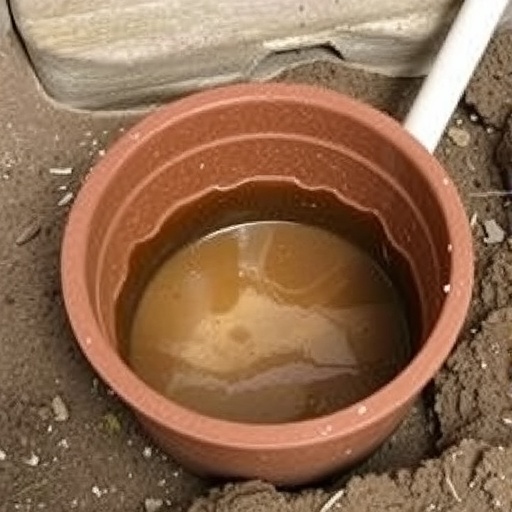In a remarkable new study, researchers Nnaji and Ozota have taken a comprehensive look into the often-overlooked realm of fecal sludge management, particularly focusing on the septic tanks commonly found in bungalow-type buildings. This groundbreaking work seeks to systematically and stratified characterize fecal sludge, a critical component of sanitary waste management that bears significant implications for public health and environmental sustainability. As urban areas grow and the construction of bungalow homes proliferates, understanding the characteristics of the fecal sludge within these systems becomes an urgent priority.
Understanding the composition of fecal sludge is essential for effective treatment and disposal methods. The presence of pathogenic organisms, nutrients, and various chemical compounds makes fecal sludge a complex mixture that requires careful analysis. The study highlights not only the physical and chemical properties of the sludge but also stresses the importance of stratified sampling. By adopting this method, the researchers are able to achieve a more accurate representation of the fecal sludge in bungalow-type septic tanks, which varies based on factors like building design, occupancy levels, and seasonal changes.
The research methodology provides valuable insights into how the fecal sludge was collected, treated, and analyzed. The authors describe their systematic approach, which involved stratified sampling from multiple septic tanks across various bungalow homes. This approach ensures that the data gathered is representative of a broader spectrum of conditions and is not skewed by local anomalies. The implications of such meticulous methodology underscore the need for rigorous scientific processes in environmental research, where the stakes are high, and the margin for error slim.
Once the fecal sludge was obtained, it underwent a series of rigorous physical and chemical tests. Factors such as Total Solids (TS), Total Volatile Solids (TVS), pH levels, and the presence of heavy metals were measured. These parameters are critical for determining how the sludge can be treated and safely disposed of. By presenting these characteristics, the study offers a comprehensive view that can aid municipalities and waste management authorities in tailoring solutions appropriate to specific needs and conditions.
The findings of this study are particularly relevant given the increasing global emphasis on sustainable waste management practices. With urban populations surging and traditional waste management systems struggling to cope, the need for alternative solutions has become crucial. The characterization of fecal sludge directly informs strategies for its treatment and contributes to developing more eco-friendly disposal methods, ultimately benefiting both the environment and public health.
Moreover, the authors delve into the implications of their findings for public health. Fecal sludge is a potential transmission medium for harmful pathogens, which can lead to disease outbreaks if not appropriately managed. The study stresses the importance of adequate treatment processes to mitigate health risks associated with improperly handled fecal waste. By educating both policymakers and the public on the characteristics of fecal sludge, the study aims to foster a more informed approach to sanitation practices in urban settings.
Another crucial aspect of this work is its potential impact on policy formulation. With solid empirical data on the characteristics of fecal sludge in bungalow-type buildings, local governments can make informed decisions regarding waste management infrastructure. The study’s insights can help allocate resources effectively and promote practices that enhance sanitary conditions, ultimately leading to improved quality of life for residents.
The significance of this research extends beyond local boundaries; it presents a model that can be replicated in other contexts, such as urban areas with similar residential designs. As more cities adopt the bungalow concept, there is a pressing need to ensure that sanitation infrastructure keeps pace with urban developments. The systematic and stratified approach developed by Nnaji and Ozota serves as a proven methodology that can be adapted to different geographical locations and cultural contexts, ensuring the relevance of this research on a global scale.
Understanding and managing fecal sludge is not solely a technical challenge; it is also a social endeavor. The study indirectly highlights the importance of public engagement in sanitation issues. Educating communities about the need for proper waste management practices is essential for fostering collective responsibility. When residents are informed about the potential dangers related to misuse of septic systems, they are more likely to adopt safer practices, leading to better outcomes in terms of health and environmental sustainability.
In conclusion, this systematic and stratified characterization of fecal sludge in bungalow-type buildings by Nnaji and Ozota shines a light on a critical but often ignored facet of urban sanitation. Their work underscores the importance of scientific inquiry in addressing pressing public health issues, while also providing a framework for future research in fecal sludge management. As nations strive for better sanitation solutions, studies like this serve as vital stepping stones toward achieving sustainable waste management and enhancing community health.
Indeed, as urban populations maintain their rapid growth, the relevance of waste management practices will only become more pronounced. High-quality data on fecal sludge characteristics will empower decision-makers and communities alike to act proactively rather than reactively when it comes to sanitation. The potential long-term benefits of such impactful research could lead to healthier, cleaner, and more sustainable urban environments for generations to come.
The journey toward enhanced waste management remains challenging, but with continued research and commitment to understanding the complexities of fecal sludge, there is hope for significant advancements in public health and environmental protection.
Subject of Research: Systematic characterization of fecal sludge from septic tanks in bungalow-type buildings.
Article Title: Systematic and stratified characterization of fecal sludge from septic tanks of bungalow type buildings.
Article References:
Nnaji, C.C., Ozota, C.E. Systematic and stratified characterization of fecal sludge from septic tanks of bungalow type buildings. Environ Sci Pollut Res (2025). https://doi.org/10.1007/s11356-025-36838-x
Image Credits: AI Generated
DOI:
Keywords: fecal sludge, septic tanks, bungalow buildings, public health, waste management, environmental sustainability.




